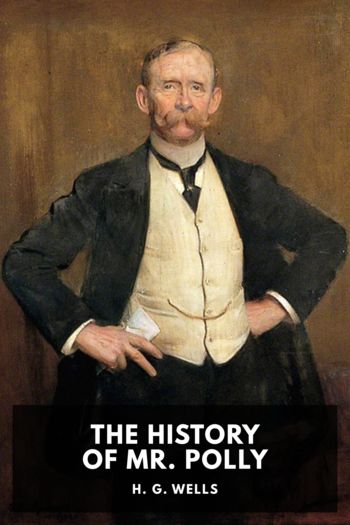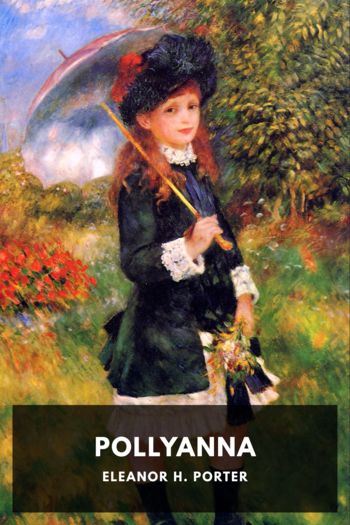Pollyanna Grows Up by Eleanor H. Porter (best ereader for epub txt) 📕

- Author: Eleanor H. Porter
Book online «Pollyanna Grows Up by Eleanor H. Porter (best ereader for epub txt) 📕». Author Eleanor H. Porter
“Well, I’m sure—I thought you liked folks,” commented the man.
“I do.” Pollyanna frowned again and pondered. “But what’s the use of such a lot of them if you don’t know ’em? And Mrs. Carew wouldn’t let me. She didn’t know ’em herself. She said folks didn’t, down there.”
There was a slight pause, then, with a sigh, Pollyanna resumed.
“I reckon maybe that’s the part I don’t like the most—that folks don’t know each other. It would be such a lot nicer if they did! Why, just think, Mr. Pendleton, there are lots of folks that live on dirty, narrow streets, and don’t even have beans and fish balls to eat, nor things even as good as missionary barrels to wear. Then there are other folks—Mrs. Carew, and a whole lot like her—that live in perfectly beautiful houses, and have more things to eat and wear than they know what to do with. Now if those folks only knew the other folks—” But Mr. Pendleton interrupted with a laugh.
“My dear child, did it ever occur to you that these people don’t care to know each other?” he asked quizzically.
“Oh, but some of them do,” maintained Pollyanna, in eager defense. “Now there’s Sadie Dean—she sells bows, lovely bows in a big store—she wants to know people; and I introduced her to Mrs. Carew, and we had her up to the house, and we had Jamie and lots of others there, too; and she was so glad to know them! And that’s what made me think that if only a lot of Mrs. Carew’s kind could know the other kind—but of course I couldn’t do the introducing. I didn’t know many of them myself, anyway. But if they could know each other, so that the rich people could give the poor people part of their money—”
But again Mr. Pendleton interrupted with a laugh.
“Oh, Pollyanna, Pollyanna,” he chuckled; “I’m afraid you’re getting into pretty deep water. You’ll be a rabid little socialist before you know it.”
“A—what?” questioned the little girl, dubiously. “I—I don’t think I know what a socialist is. But I know what being sociable is—and I like folks that are that. If it’s anything like that, I don’t mind being one, a mite. I’d like to be one.”
“I don’t doubt it, Pollyanna,” smiled the man. “But when it comes to this scheme of yours for the wholesale distribution of wealth—you’ve got a problem on your hands that you might have difficulty with.”
Pollyanna drew a long sigh.
“I know,” she nodded. “That’s the way Mrs. Carew talked. She says I don’t understand; that ’twould—er—pauperize her and be indiscriminate and pernicious, and—Well, it was something like that, anyway,” bridled the little girl, aggrievedly, as the man began to laugh. “And, anyway, I don’t understand why some folks should have such a lot, and other folks shouldn’t have anything; and I don’t like it. And if I ever have a lot I shall just give some of it to folks who don’t have any, even if it does make me pauperized and pernicious, and—” But Mr. Pendleton was laughing so hard now that Pollyanna, after a moment’s struggle, surrendered and laughed with him.
“Well, anyway,” she reiterated, when she had caught her breath, “I don’t understand it, all the same.”
“No, dear, I’m afraid you don’t,” agreed the man, growing suddenly very grave and tender-eyed; “nor any of the rest of us, for that matter. But, tell me,” he added, after a minute, “who is this Jamie you’ve been talking so much about since you came?”
And Pollyanna told him.
In talking of Jamie, Pollyanna lost her worried, baffled look. Pollyanna loved to talk of Jamie. Here was something she understood. Here was no problem that had to deal with big, fearsome-sounding words. Besides, in this particular instance—would not Mr. Pendleton be especially interested in Mrs. Carew’s taking the boy into her home, for who better than himself could understand the need of a child’s presence?
For that matter, Pollyanna talked to everybody about Jamie. She assumed that everybody would be as interested as she herself was. On most occasions she was not disappointed in the interest shown; but one day she met with a surprise. It came through Jimmy Pendleton.
“Say, look a-here,” he demanded one afternoon, irritably. “Wasn’t there anybody else down to Boston but just that everlasting ‘Jamie’?”
“Why, Jimmy Bean, what do you mean?” cried Pollyanna.
The boy lifted his chin a little.
“I’m not Jimmy Bean. I’m Jimmy Pendleton. And I mean that I should think, from your talk, that there wasn’t anybody down to Boston but just that loony boy who calls them birds and squirrels ‘Lady Lancelot,’ and all that tommyrot.”
“Why, Jimmy Be—Pendleton!” gasped Pollyanna. Then, with some spirit: “Jamie isn’t loony! He is a very nice boy. And he knows a lot—books and stories! Why, he can make stories right out of his own head! Besides, it isn’t ‘Lady Lancelot,’—it’s ‘Sir Lancelot.’ If you knew half as much as he does you’d know that, too!” she finished, with flashing eyes.
Jimmy Pendleton flushed miserably and looked utterly wretched. Growing more and more jealous moment by moment, still doggedly he held his ground.
“Well, anyhow,” he scoffed, “I don’t think much of his name. ‘Jamie’! Humph!—sounds sissy! And I know somebody else that said so, too.”
“Who was it?”
There was no answer.
“Who was it?” demanded Pollyanna, more peremptorily.
“Dad.” The boy’s voice was sullen.
“Your—dad?” repeated Pollyanna, in amazement. “Why, how could he know Jamie?”
“He didn’t. ’Twasn’t about that Jamie. ’Twas about me.” The boy still spoke sullenly, with his eyes turned away. Yet there was a curious softness in his voice that was always noticeable whenever he spoke of his father.
“You!”
“Yes. ’Twas just a little while before





Comments (0)